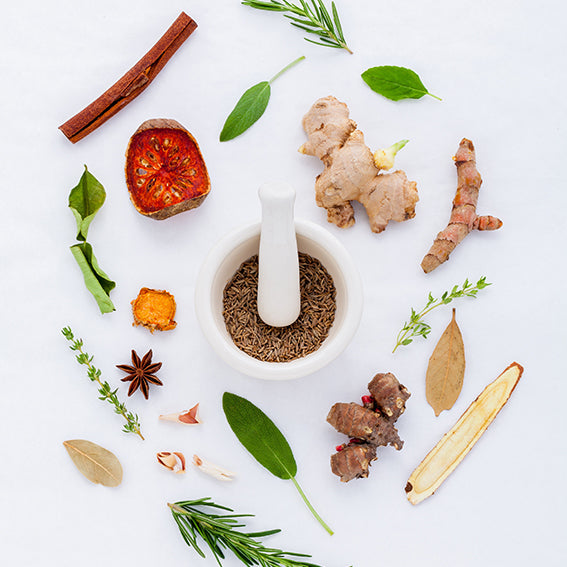Total
$0.00
As adults, we tend to use herbs and spices on a daily basis, to enhance the natural flavors of the food we eat. For some reason however, baby food is all too often bland, tasteless and devoid of any flavors. This is especially true when it comes to conventional, store-bought baby food that is sold in western countries such as the United States, Canada and the U.K. In many other parts of the world however, spices are introduced at a very early age.
From Indian babies that are fed wholesome curries, to Thai babies that grow up eating fragrant spices and coconut milk and South American babies that are fed spicy meals rich in cumin and even chili, culture plays a big role in diet… in babies as well as adults.
Why Are Herbs and Spices Important in baby food?
Introducing herbs and spices into your baby’s food helps to expand their taste buds, provide healthy flavors that is free of MSG and other nasty additives, while also providing a varied diet that the whole family can enjoy.
When babies are able to try the foods that the rest of the family eats, mealtimes become much simpler for everyone – including busy parents. Babies that are given a more varied diet from early on, often have far more ability to try new tastes and flavors later, which in turn helps to reduce fussy eating habits and nurture flexible eating instead.
Best of all, using spices and herbs to enrich flavors will ensure that your baby starts off without ever needing less healthy additives to add variety to food.
When Can Herbs and Spices be Introduced?
Breastfed babies are often introduced to a variety of spices even before starting solids. This is because breast milk can change in flavour, depending on what's eaten, so eating flavorsome foods whilst breast feeding can essentially help baby develop a taste for flavoured foods as well.
With this in mind, most pediatricians will recommend to experiment with herbs and spices from the beginning stages of weaning, whether its by purees or baby-led. As salt and sugar should be avoided before age one, adding a little spice and/or herbs is a great way to add flavour to baby food.
Which Herbs and Spices are best in baby food?
It is best to introduce the aromatic spices first such as cinnamon, mixed spice, nutmeg, garlic, turmeric, ginger, coriander, dill and cumin. These spices have many benefits, ranging from antioxidant properties to anti-inflammatory properties, immune system improvement and plenty of other benefits too.
Hot spices however, such as chilli, curry, hot paprika, cayenne pepper and other pepper based spice are best left until your baby is at least a year old. These spices can trigger reactions, and as they trigger pain receptors in the brain, should be introduced in very small amounts when they are eventually introduced.
Integrating herbs and spices
Below are some ideas of good ways to integrate herbs and spices in your baby's food:
• Apples: cinnamon, nutmeg, allspice, vanilla or ginger
• Pears: ginger, cinnamon, vanilla or mint
• Bananas: cinnamon, ginger, allspice or vanilla
• Carrots: basil, garlic or cinnamon
• Pumpkin: cinnamon, nutmeg, ginger and vanilla
• Acorn, Hubbard, Butternut and other Squash: cinnamon, nutmeg, allspice or ginger
• Sweet Potato: nutmeg, cinnamon or cardamom
• Mashed Potatoes: dill or garlic
• Green Beans: garlic powder
• Meat: garlic, pepper, onion powder, mint or orange zest.
• Poultry: cinnamon, coriander, garlic, pepper, basil, oregano, sage, rosemary or thyme
• Plain Yogurt: mint, cinnamon, nutmeg, vanilla, ginger, allspice or cardamom
• Oatmeal and Cereal: cinnamon, nutmeg or vanilla
• Pasta: oregano, garlic or basil
• Quinoa (for sweet): cinnamon, nutmeg, vanilla, cardamom or ginger
• Quinoa (for savory): garlic powder, pepper, onion powder, basil or oregano
• Millet (for sweet): cinnamon, nutmeg, vanilla, cardamom or ginger
• Millet (for savory): garlic powder, pepper, onion powder, basil or oregano
Both ground and whole spices as well as ground and fresh herbs can be used, with both offering benefits depending on how the food is prepared. Ground spices and herbs are best for smoother textures, which makes it a better option when adding to food that has already been cooked and pureed. Whole spices and fresh herbs can be used during the cooking process, and are typically higher in antioxidants.
Most herbs and most aromatic spices are mild enough to not typically cause any reactions, but just like any other new food you introduce, it is suggested to do so during daytime feeds. That way, if your baby does have a reaction, they will be easier to watch and respond to if required.







